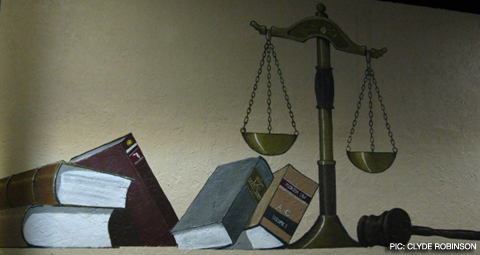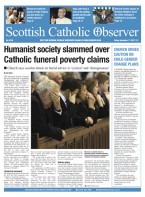November 17 | ![]() 0 COMMENTS
0 COMMENTS ![]() print
print

Weighing the scales at the year’s end
As the nights drawn in, THE BOW IN THE HEAVENS asks if we are doing our bit to support the Church —By FR JOHN BOLLAN
Mid-November always seems to bring a chill with it. The nights are dark, and I always begin to struggle with the temptation to start on the Christmas carols. This isn’t helped by the fact that shops and TV ads have declared the festive season well and truly open—or at least the consumer bit of it.
Liturgically, however, we have to sit with the Month of the Holy Souls, keeping that vigil until the time comes to move into the next cycle of the Church’s life. Indeed, the transition is quite a smooth one, since the first notes of the Advent symphony are very similar to those which round off the old year: stay awake, stand ready, be watchful.
The darkness of the nights can throw up certain logistical challenges for a parish priest. I must ensure the approaches to the Church are sufficiently lit and therein lies a challenge for me just now: the floodlights at the front of the Church are on a timer which has gone slightly out of synch with the seasons. The problem is compounded by the fact that I can’t find an instruction manual for the model of timer installed and my attempts to ‘play it by ear’ have largely resulted in me ‘playing it by pig’s ear.’ The lights come on and off in random bursts like the most rubbish disco ever. I have called the local electrician to come sort it for me.
Some people have an inborn knack for sorting such things. Sadly, it’s not a talent I possess. This Sunday’s Gospel invites us to reflect on the use of talents. While we tend to associate talents with skills, a talent was originally a unit of weight. The parable is as much about our substance as people as it is about our portfolio of abilities and what we do with them.
What draws censure from the master in the parable is not just the waste of uninvested money but allowing fear to call the shots (since the lazy servant claims it was fear which led him to stick to the safe option). I guess that is where the idea of weight comes in: if we are sufficiently ‘substantial’ in our lives, then it will be harder for fear to take us down or stop us in our tracks.
So, as we approach the end of the year, rather than carry out an inventory of my skills—and the list seems shorter each year—I’ll be assessing my weight as an individual and as a member of the Church. Am I pulling my weight? Is my centre of gravity the share of grace allotted me? Or am I too allowing fear to dictate my actions like the poor servant in the Gospel?
One particular gift I have been given lately—on behalf of the parish—is a statue of ‘sleeping St Joseph.’ I have written before of this devotion, which Pope Francis has popularised during his time as Pope. A kind parishioner acquired a larger version of the statue which I intend to install in a place of due prominence to the side of the sanctuary.
We already have a little shrine to our patron in the porch of the Church, and I fear the statue would get lost there (or even stolen!); placing it on the sanctuary means it will not only be visible, but accessible to those who wish to place a concern or intention for St Joseph to sleep on.
I’ve even worked out an approach route so that the statue can be reached from the side gate of the sanctuary without directly crossing it. In this regard, I am mindful not only of the sacred space of the sanctuary, but also of the carpet which must be kept spotless or yours truly will be next to be thrown out into the dark, ‘where there will be weeping and grinding of teeth.’
This week sees an assembly of clergy to begin a conversation about the future shape of our diocese, arising out of the synod discussions. This will inevitably involve consideration of the number of parishes, distribution of clergy and provision of Masses.
It is a conversation which needs to take place, of course, but no one would claim it’s one we’d want to be having. In an ideal world, we would have bustling parishes, plentiful vocations and an army of committed laypeople to carry forward the mission of the Church.
The reality, however, is that we don’t. And while there are no doubt some green shoots of growth here and there, this Sunday’s parable reminds us that we have to work with what we have.
Although a couple of parishes in our diocese share a priest, we have had comparatively few closures. I know that almost every other diocese in the country has, sadly, had to come to terms with losing churches, and communities have undergone the upheaval of joining with their neighbours.
The process, however much motivated by charity, can often be painful and the sense of loss is very real. Perhaps it’s worth remembering that those letters of St Paul, which constitute most of our second readings at Mass, were addressed not to folk sitting in churches or parishes, but primarily to a church of people. When all is said and done, that is what we still are.
And it’s not just churches which can struggle to get people through the doors. I was upset to learn that next year’s Global Atheist Convention, due to be held in Melbourne, has had to be cancelled due to poor ticket sales. Oh well, at least it saves Professor Dawkins a wasted journey down under.
In what I hope will be a delight not too long in coming, I’m looking forward to seeing the new Paddington movie. I have loved the little bear since I was a child. Instead of a St Christopher, my car keys (below) have a little Paddington attached to them.
I still laugh when I remember going to pick my car up from the garage after a service had been carried out. I arrived at the same time as a young woman who was there for exactly the same purpose. The chap on the desk shouted our registration numbers back into the workshop and, after a few moments, a grease-smeared mechanic appeared with our car keys.
Without checking, I was handed the key with a Manchester United ring and the Paddington Bear keyring was passed to the girl. There was an awkward moment’s silence—finally resolving into laughter—when our keys were reunited with their proper owners.
I know some might roll their eyes at my love of the late Michael Bond’s creation, but I couldn’t give a stale marmalade sandwich for their disapproval. There’s too much misery in the world to begrudge grown-ups a wee bit of heart-warming escapism every now and again.
Besides, even Paddington isn’t immune from reflecting the concerns of 21st century society. I have heard one or two reviewers bemoan a thread, not too in your face I think, of a ‘refugee agenda’ in this film (as in the first). It didn’t bother me then and it wouldn’t bother me now, quite frankly.
Even though he’s been persuaded to feature in this year’s Marks and Spencer Christmas advert, I don’t think old Padders has sold out to the corporate moneymen. I’m sure any appearance fee will be donated, in accordance with his charitable principles, to SCIAF or Mary’s Meals—even if they do have to increase the marmalade content of their collations.











